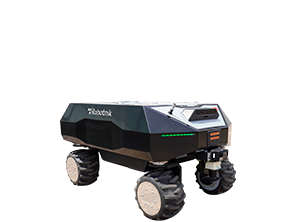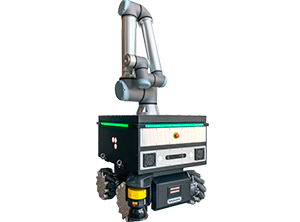The rapid evolution of factory automation is pushing industries to adopt smarter and more efficient technologies. Among these innovations, industrial mobile robots stand out as game changers. These autonomous machines navigate manufacturing environments, performing critical tasks with precision. This article dives into the latest innovations, applications, and environmental benefits of industrial mobile robots, showcasing how they are revolutionising production lines and driving sustainability in Industry 4.0.
WHAT ARE INDUSTRIAL MOBILE ROBOTS USED FOR?
Industrial mobile robots are used in manufacturing environments for tasks such as transporting materials, handling delicate parts, inspecting products for quality control, and assisting in logistics. These robots operate autonomously and adapt to changing environments, making them highly valuable in industries like electronics, automotive, and pharmaceuticals.
HOW DO INDUSTRIAL MOBILE ROBOTS NAVIGATE THROUGH A FACTORY?
Industrial mobile robots use advanced sensors, cameras, and navigation software to autonomously move through a factory. They rely on technologies like LiDAR, GPS, and AI to detect obstacles, optimise routes, and adjust to real-time changes in the environment, making them more flexible than traditional guided vehicles.
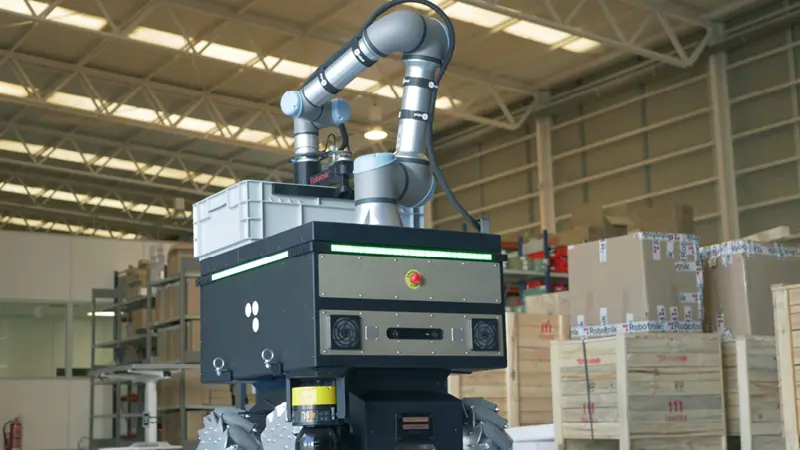
TOP INDUSTRIES LEVERAGING INDUSTRIAL MOBILE ROBOTS FOR EFFICIENCY
This is the ranking of the 3 professional sectors that implement the most industrial manufacturing robots, according to official IFR World Robotics 2023 data:
- The electrical/electronics industry became the largest customer of industrial robots in 2020 and has maintained this position ever since. In 2022, it increased robot installations in the production of household appliances, electrical machinery, semiconductors, solar panels, computers, telecommunication devices and video entertainment and electronics by 10%, the highest level ever recorded.
- The automotive industry lost its position as the largest customer for industrial robots in 2020. Despite a strong growth rate of 16% in 2022, it remained in second place. The automotive industry had been the largest customer of industrial robots since the first commercially sold unit was installed at the General Motors plant in New Jersey in 1961.
- The metal and machinery industry consolidated its position as the third largest customer industry, accounting for 12% of all installations in 2022. Both metal products producers and industrial machinery producers have installed substantial numbers of robots in recent years.
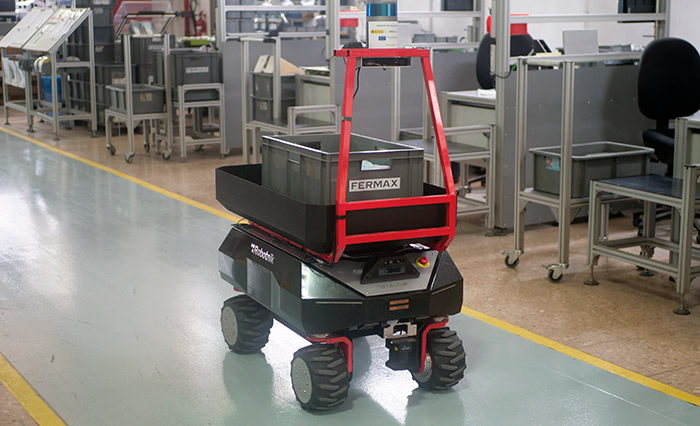
5 GROUNDBREAKING APPLICATIONS OF INDUSTRIAL MOBILE ROBOTS IN INDUSTRY 4.0
The applications that Industrial mobile robots run in manufacturing environments are becoming more precise, complex and intelligent as the technology sector evolves.
Now, an industrial AMR has more autonomy, more precision in navigation and a greater capacity to provide more intelligent responses to the environment.
These are some of the applications what these robots perform in industry 4.0:
- Industrial robots for transportation self-employed materials One of the most common uses of industrial mobile robots is the transportation of materials within factories. Autonomous mobile robots are used to move parts, components or finished products between different areas of the production plant without any human intervention. They can also assemble components while moving from one workstation to another, integrating the work of different areas of the factory into a single continuous process. This increases flexibility and reduces waiting times between different phases of the production process.Unlike traditional fixed transporters or automated guided vehicles (AGVs), AMRs can make real-time decisions on the best route to take, avoiding obstacles and adjusting to the conditions of the environment.
- Industrial robots for handling delicate parts Within the range of industrial mobile robots are autonomous mobile manipulators capable of picking, transporting and assembling complex components with millimetre precision. Many manufacturing companies have processes involving the handling of products that require a high level of precision. An example of this is the electronics industry with the manipulation of microchips or sensitive electronic components.As mentioned before due to the data shown by IFR in 2023, The electrical/electronic industry is currently the main industrial robots’ customer for tasks such as the production of electrical appliances, electrical machinery, semiconductors, solar panels, computers, telecommunication devices and entertainment devices.
- Industrial robots for inspection and quality control Mobile robots are also playing an important role in product inspection and quality control. They integrate advanced sensors, cameras, and machine learning technology to move through the production line, inspect products, and detect deficiencies with much greater accuracy than human inspectors. This improves the quality of the products and significantly reduces the misuse of resources and materials derived from manufacturing errors.
- Industrial robots for construction Although automation in the construction industry is still underdeveloped compared to other industries, mobile robots are already used for tasks such as transporting building materials or mapping and inspecting sites.
- Industrial robots in pharmaceuticals Mobile robots are getting more and more common for the handling of medicines and chemicals both in laboratories and in the pharmaceutical industry. They are used in internal logistics, for example in the transport of hazardous substances, improving safety in pharmaceutical production plants.
These are just a few examples of industrial robots, but statistics on industrial robotics show that the use of robots is becoming more and more diversified: retail, eCommerce, aerospace or in recycling plants.
HOW INDUSTRIAL MOBILE ROBOTS ARE TRANSFORMING FACTORY AUTOMATION
Industrial manufacturing has long been a significant contributor to environmental issues, but many companies are now focusing on reducing their ecological footprint through more sustainable practices. One of the key ways they are doing this is by integrating industrial mobile robots into their operations.
Although these robots do have an environmental cost, primarily due to energy consumption and the materials used in their production, they offer several notable advantages compared to traditional manufacturing methods. Their precise operations and ability to work continuously bring clear benefits to both efficiency and sustainability.
Below are some of the most significant ways industrial mobile robots are positively impacting the environment:
- Waste reduction Thanks to their level of precision, mobile robots can perform repetitive tasks with great accuracy, reducing waste of materials from defective products. For example, in assembly or parts manufacturing processes, the use of robots reduces the number of errors along with the need to redo work and, consequently, minimises the unnecessary use of unsustainable materials such as plastic.
- Optimization of energy consumption Deploying industrial mobile robots in factories can also contribute to greater energy efficiency. They are designed to minimise energy consumption during their operations. In addition, their ability to work continuously and without interruption optimises energy use in factories. Some advanced robotic solutions such as these have the option of autonomous recharging and can manage their energy consumption efficiently.
- Reducing the carbon footprint in logistics Inside factories, logistics management can cause significant carbon emissions due to the use of traditional motorised vehicles. Industrial manufacturing robots can lighten internal or external logistics by moving around with reduced emissions. In addition, by optimising routes and avoiding unnecessary travel, industrial mobile robots contribute to more sustainable logistics operations.
- Recycling and reusing of materials The development of robotics has also evolved in the use of more sustainable materials for the manufacture of the robots themselves, developing more durable and recyclable systems. Robotnik works to incorporate more and more recycled materials in our mobile robots and mitigate the environmental impact associated with their manufacturing.
Sustainability is one of the great challenges of the 21st century and manufacturing industries are looking for new ways to minimise their environmental impact. Industrial mobile robots are an important asset in the transition towards more sustainable manufacturing.
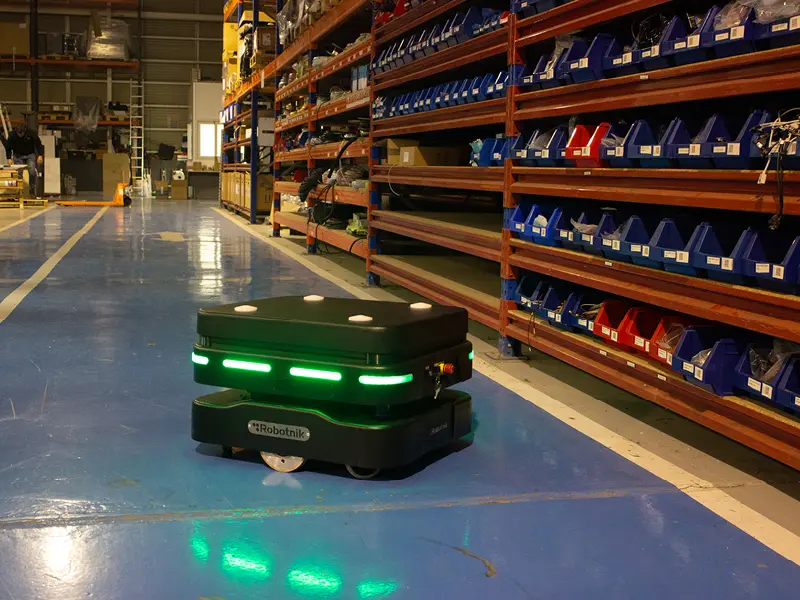
THE ENVIRONMENTAL IMPACT OF INDUSTRIAL MOBILE ROBOTS: A PATH TO SUSTAINABILITY
Industrial mobile robots are already established for factory automation performing tasks such as logistical transportation or parts handling and sorting.
The challenge in industrial robotics lies in improving efficiency intelligently for more profitable and sustainable industry automation.
The convergence between industrial automation & robotics is a key alliance on the path towards sustainable manufacturing.
Industry 4.0 marks a new era in factory automation and digitalization of industrial processes, integrating technologies such as robotics, the Internet of Things (IoT), Artificial Intelligence (AI) and Big Data to improve production efficiency and open new paths towards productive processes with a lower environmental impact.
Promoting the transition towards more sustainable industrial practices through the use of renewable energy, improving product traceability and implementing more flexible production systems that adjust energy demand in real time contribute not only to the competitiveness of companies, but also to the creation of more ecological and environmentally responsible processes, reducing the carbon footprint and promoting the efficient use of natural resources.
Therefore, autonomous mobile robotics and Industry 4.0 offer advantages in terms of productivity and play a crucial role in creating a more sustainable future from an environmental perspective.
FAQs about robotics
Industrial mobile robots offer numerous advantages, including increased operational flexibility, reduced labour costs, improved production efficiency, and the ability to automate complex tasks without human intervention. Their mobility and adaptability make them perfect for dynamic factory environments.
Industrial mobile robots navigate using a combination of sensors, GPS, LiDAR, and AI-based software. These systems allow robots to detect obstacles, map factory layouts, and make real-time decisions about the best routes to take, ensuring safe and efficient movement throughout the facility.
Common applications of industrial mobile robots include material transportation, quality control inspections, delicate part handling, assembly tasks, and internal logistics. These robots can also work in areas like pharmaceuticals for transporting hazardous materials and in construction for site mapping and material movement.
Yes, industrial mobile robots help reduce the environmental impact by optimising energy consumption, reducing material waste, and lowering carbon emissions in internal logistics. They perform tasks with greater precision, which reduces errors and resource use, leading to more sustainable production practices.
Industry 4.0 integrates industrial mobile robots with IoT, AI, and Big Data to automate factory processes. These technologies allow robots to communicate with other machines, gather real-time data, and optimise production workflows autonomously, making factories more efficient and adaptable to changing demands.
Yes, industrial mobile robots are often more efficient than traditional robots, particularly in dynamic environments. Unlike fixed robots, mobile robots can move between locations, adjust to new tasks, and make autonomous decisions based on real-time data, improving overall factory efficiency and productivity.
